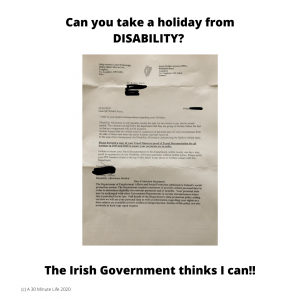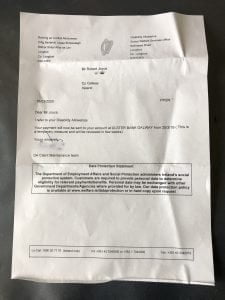
My legs are a disaster. In the last year I have started using an FES device for my right leg, and my left one is now like my right was a year and a half ago. Sativex helps with my mobility, but its cost is prohibitive, and now I only use it occasionally when I know I will do much more than I am capable of. It gives me a valuable boost.
In this physical reality of pain and lost mobility, I have been finding my way in the world of Patient Advocacy (PA) and Patient and Public Involvement (PPI) in medicine. This has been gaining momentum over the last year and a half and slowly I am learning about this vast area. For now, I am relying on my lived experience of illness over the 50+ years of my life. Illnesses like asthma, multiple sclerosis, sarcoidosis and chronic pain, have been part of my life over this half century. Being sick is something I know, I know a lot about it, and I have also seen the effects of cancer on relatives, and the toll it takes on the person, and those living around them.
The danger with illness is you become introspective, thinking about this pain, that sensation, and if I will get better, or will it be just another thing to add to the list of extra illnesses I have, or comorbidities (I am learning to speak like a medical person). To overcome this inward-looking behaviour, I have my PA and PPI project. It is giving me something positive to focus on, and I hope it will be of value to the wider community. To really achieve this well I have a lot of listening to do, and then understanding, so I can perform this role.
Time for learning
For now, I am training to be a Patient Expert with EUPATI; I am a patient Advisor to IMI-PARADIGM and IMI-PREFER, and I am a Research Assistant on a study about a new therapy to help cognition in people with MS. On Wednesday and Thursday this week I was fortunate enough to get a bursary to attend the Trinity Health and Education International Research Conference 2020 (Integrated Healthcare: Developing Person-Centred Heath Systems) in Dublin in my role as a PPI. To attend an event like this uses so much energy and an increase in pain levels, can act as a real obstacle to participation. Armed with Sativex, I dosed myself for the day before travelling and throughout the event. Despite this on Thursday afternoon, even Sativex could not control the pain.
At the event I had the privilege to meet Derek Mitchell (CEO of IPPOSI), Derek Stewart OBE (a PA of 20+ years of experience) and Ann Cody (Head of Pre-Award, Health Research Board) and many more people who I spoke with during the coffee and lunch breaks. The Conference focused on the Patient and how we (the patients) should be the centre of research, and the medical system, and that we must be co-equal stakeholders.
HRB leading PPI
One thing which I feel is so important is that the HRB has a goal of facilitating this, and they have accepted their lack of understanding on how best to do PPI, and if there is one best way, or many ways. To improve this learning they have funded Ignite whose task is to facilitate PPI in the Universities around the country. These units are working together to learn off each other, and see what is being done well, and areas where improvements are needed. Learning by doing, not talking about it. I love this, and it is my way of learning. Experience it, and figure out what you are doing well, and what you are doing poorly, adjust and start again.
My role as a Research Assistant results from the HRB requiring PPI as part of the grant application, and PPI Ignite NUIG, facilitating the Principal Investigator (PI) on the project I am on, on how to do PPI. This job has been fantastic for me, my mental health has improved, and I have been part of changes in the project which will hopefully make it better suited to PwMS (People with Multiple Sclerosis).
Workshops
On the final day I attended a workshop where 4 different groups presented how they have included the people they are studying in the design and implementation of the research. One study has been continuing for over 10 years, long before PPI as a term existed. Prof Mary McCarron (Principal Investigator) had decided to be inclusive. It was truly inspiring. Unfortunately, we didn’t have enough time, and I think the discussion could have lasted long into the night.
They raised one topic in the discussion after the presentations, which was significant to me. Remuneration. Should the Patients involved in research get financial compensation for the input they make in research? Comments like ‘Gift Cards” and “Disability Allowance” were mentioned, and the discussion stopped. In the next few weeks I will write something about this topic, looking at the two viewpoints, and giving my opinion too.
What Next?
Patient Advocacy and my Involvement in research has given me something which I had lost.
Control.
My illnesses will run their courses, and I have very little impact on this other than trying to keep healthy and fit (which is becoming more challenging every day). By being involved in something which is much bigger than me I have gained back some way of influencing the course of my life. It will never be full-time, and I have to manage my interactions carefully. I am sure there will also be days when I will not do anything due to fatigue, pain.
To be able to contribute to improved quality of life of PwMS, and to an even wider audience of people with illness, would be worthwhile, and a way I can find purpose again in my life. Something which pain and MS grabbed from me.



